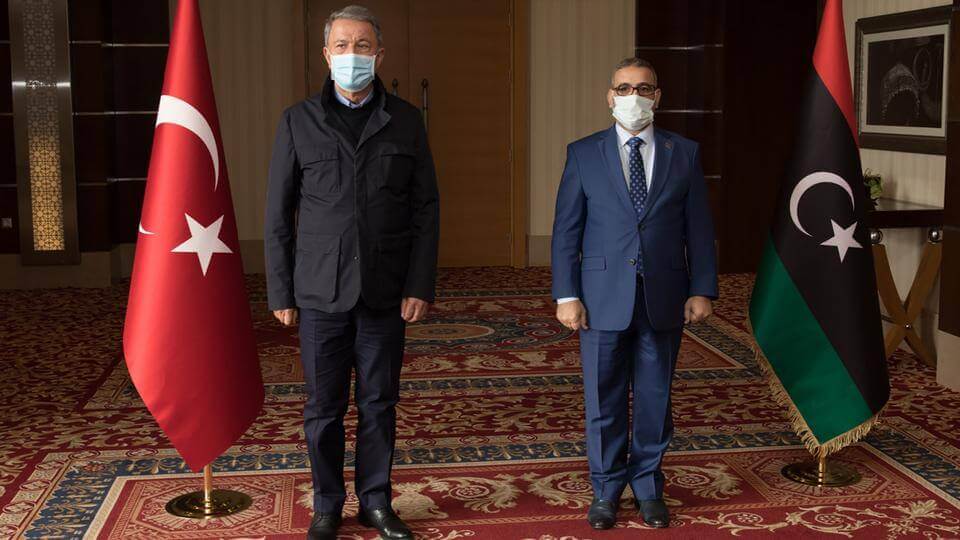Turkey’s defence minister, Hulusi Akar, visited Libya on Saturday for an unscheduled two-day tour to further strengthen military cooperation between Tripoli and Ankara. Akar’s visit came soon after the Turkish parliament on Tuesday extended a law that allows the deployment of Turkish troops to Libya for another 18 months. This development was an outcome of the commander of Libyan National Army (LNA), Khalifa Haftar’s, threat to attack Turkish forces, who back the internationally-recognised government in Tripoli, or the Government of National Accord (GNA).
Speaking at a news conference in Tripoli, Akar said that all actions Haftar and his troops would be considered “legitimate targets” if there are any attacks against Turkish forces. “What matters here is that everyone should contribute to a political solution. Any action other than that would be wrong,” he added.
The oil-rich country has been in chaos since the Arab Spring protests and NATO bombing campaign that toppled dictator Muammar Gaddafi in 2011. Since then, several attempts have been made to build a democratic state by mainly two rival groups: the GNA, based in western Libya, and the Libyan National Army (LNA), based in eastern Libya. The tensions between the two resulted in a civil war in 2014. As a result, several international actors, including Turkey, have intervened to defend their own strategic and economic interests in the country.
Turkey backs the GNA and has deployed troops in the country since April in a military cooperation deal, as is Tripoli’s primary and most important ally in its fight against the rebels. On the other hand, the LNA has been backed by the United Arab Emirates and Egypt, apart from Russia.
On January 2, 2020, the Turkish parliament approved an official intervention in Libya and Ankara’s forces have stationed a large military base in the al-Watiya region on Libya’s border with Tunisia. Turkey’s intervention has enabled the GNA to assert complete control over Tripoli.
Further, Ankara has used its maritime boundary agreement with the GNA to renew its rights to conduct exploration and drilling activities in the disputed waters of the Eastern Mediterranean. Gas reserves found in the Eastern Mediterranean region near Cyprus could provide a much-needed source of income for Turkey as declining foreign direct investments (FDI) and a spiralling Turkish lira loosens President Recep Tayyip Erdoğan’s grip on power.
However, last year Greece raised objections against the maritime deal between Turkey and Libya as a violation of international law. According to the Greek government, “the sea zones of Turkey and Libya do not meet, and nor is there a sea border between the two states”. For a long time, both Turkey and Greece have been at loggerheads over mineral rights in the Aegean Sea.
Accordingly, Akar also addressed the tensions between Turkey and Greece as well and said that he would be willing to resolve the tensions related to the Eastern Mediterranean, Aegean Sea, and Cyprus within the scope of international law. “Unfortunately, third parties fail to see this and take sides. We expect the third sides to be reasonable and objective. Yet, our Greek neighbours exploit the situation at every opportunity and use provocative, tension-increasing methods,” he said.
This point was reinforced by foreign ministry spokesperson Hami Aksoy who said in a press conference: “We see that Greece continues her provocative and escalatory steps in the region.” He went on to say, “The latest example is the Notice to Airmen (NOTAM) promulgated by Greece by which it declared 15 military exercise areas, including the islands under demilitarized status, that blocks the Aegean all along and a very large portion of the Eastern Mediterranean starting from January 4 until February 26, 2021.” Thus he declared, “We call on Greece to act with common sense and in a responsible manner by contributing to our efforts to strengthen peace and stability in the region within the framework of good neighbourly relations.”
Given the extension of the deployment of Turkish troops to Libya, however, it is unlikely that these tensions will be resolved in the immediate future.
Turkey’s Defence Minister Visits Libya to Strengthen Military Cooperation
Turkish Defence Minister Hulusi Akar visited Libya following the parliament’s decision to extend Turkish troops’ deployment in Libya.
December 29, 2020

Turkish Defense Minister Hulusi Akar (L) and President of the Libyan Chairman of the High Council of State Khalid Al-Mishri SOURCE: TRT
